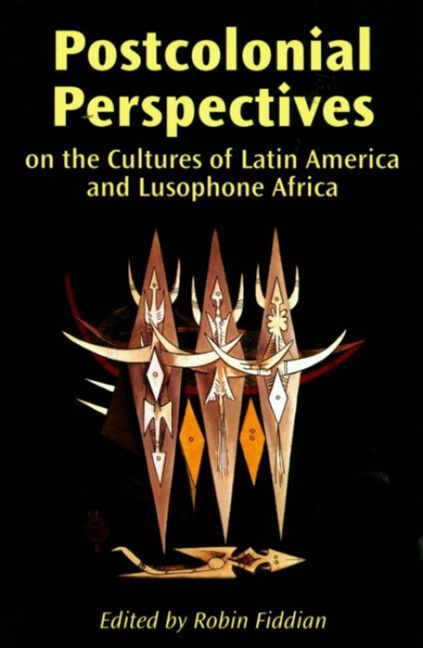Book contents
- Frontmatter
- Contents
- Preface
- Locating the Object, Mapping the Field: the Place of the Cultures of Latin America and Lusophone Africa in Postcolonial Studies
- Chapter One On Metropolitan Readings of Latin American Cultures: Ethical Questions of Postcolonial Critical Practice
- Chapter Two Ig/noble Barbarians: Revisiting Latin American Modernisms
- Chapter Three José Carlos Mariátegui: Culture and the Nation
- Chapter Four Doing Time in Peru: the Poetics of Multitemporality as Method for Cultural History
- Chapter Five America, Americanism and the Third World in the Work of Leopoldo Zea
- Chapter Six Fernando Ortiz's Transculturation: the Postcolonial Intellectual and the Politics of Cultural Representation
- Chapter Seven Caribbean Masks: Frantz Fanon and Alejo Carpentier
- Chapter Eight Colonial Crosswords: (In)voicing the Gap in Mia Couto
- Index
Chapter Six - Fernando Ortiz's Transculturation: the Postcolonial Intellectual and the Politics of Cultural Representation
- Frontmatter
- Contents
- Preface
- Locating the Object, Mapping the Field: the Place of the Cultures of Latin America and Lusophone Africa in Postcolonial Studies
- Chapter One On Metropolitan Readings of Latin American Cultures: Ethical Questions of Postcolonial Critical Practice
- Chapter Two Ig/noble Barbarians: Revisiting Latin American Modernisms
- Chapter Three José Carlos Mariátegui: Culture and the Nation
- Chapter Four Doing Time in Peru: the Poetics of Multitemporality as Method for Cultural History
- Chapter Five America, Americanism and the Third World in the Work of Leopoldo Zea
- Chapter Six Fernando Ortiz's Transculturation: the Postcolonial Intellectual and the Politics of Cultural Representation
- Chapter Seven Caribbean Masks: Frantz Fanon and Alejo Carpentier
- Chapter Eight Colonial Crosswords: (In)voicing the Gap in Mia Couto
- Index
Summary
One of the major contentions in the postcolonial debate is the appropriateness of the term ‘post(-)colonial’ in a multitude of historical contexts. This essay argues that Cuban polymath Fernando Ortiz (1881–1969), although still relatively unknown outside the Spanish-speaking world, ranks among the most important theorists of the postcolonial condition. Consideration of his extensive work within its specific historical context will enable us to further refine the terms commonly employed in Anglo- and Franco-centric discourses. To more fully appreciate the significance of Ortiz's work for postcolonial theorization, the political status of postindependence Cuba must be taken into account. That Cuba passed from a colonial to a postcolonial status vis-à-vis metropolitan Spain in 1898 is indisputable. The fact that the end of European colonialism was concomitant with the onset of US neocolonialism on the island is well documented. As military governor General Wood wrote at the time, ‘I believe that [Cuba] is a very desirable acquisition to the United States. The island will be gradually “Americanized” and in due course we will have one of the most rich and desirable possessions existing in the world.’ The US occupation of Cuba, which led Lenin to formulate his theories on the highest (or latest) forms of capitalism (monopoly capitalism), was the very first example of US global imperialism. Cuba became a political protectorate of the United States until 1934 and an economic dependency until 1959. From the 1920s on, Ortiz and other Cuban intellectuals struggled to gain control of the means of cultural production in an effort to resist the hegemony of the United States.
It is important to remember that Ortiz was born and educated within a colonial regime. He was seventeen when Cuba secured formal independence, but his education continued in Spain. Like many postcolonial writers of the white intellectual elite, Ortiz adopted a metropolitan perspective in his early work, particularly with respect to Cuban blacks. Later, in the mid-1920s, when the full implications of US intervention became clear, his viewpoint shifted markedly. If his first book can be said to mimic colonial discourses, with the proviso that for him the colonized other was alive and well at home, his later studies demonstrate a keen awareness of the need to encourage the recognition and expression of an autonomous, hybrid national culture.
- Type
- Chapter
- Information
- Publisher: Liverpool University PressPrint publication year: 2000



